
How to Start a Worm Farm Business
How to Start a Worm Farm Business: Intro
For those of us with a passion for worm farming at home, scaling up your hobby into a thriving side hustle or full-blown business is an exciting opportunity!
This guide is crafted for worm farming enthusiasts ready to expand their at-home operation, and hopefully, their income!
This guide provides a step-by-step approach to starting your own worm farm, covering everything from initial considerations and planning to marketing your products and ensuring you're well-equipped to turn your green thumb into a green enterprise!
Benefits of Starting a Worm Farm
Starting a worm farm offers a number of exciting possibilities, including:
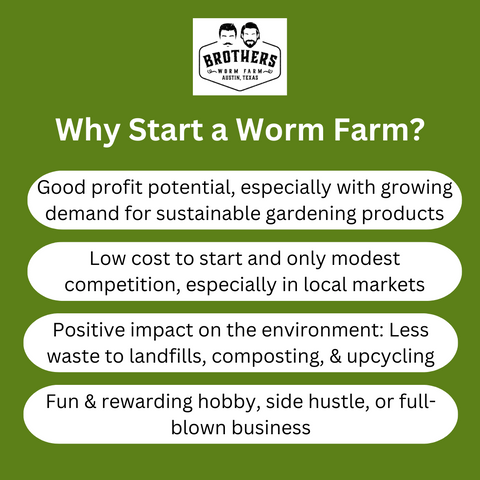
Understanding the Market for a Worm Farm
The customer markets (which drive sales and customer demand!) for a worm farm are driven by the 2 main outputs produced by a worm farm:
- Worms
- Worm Castings and Tea
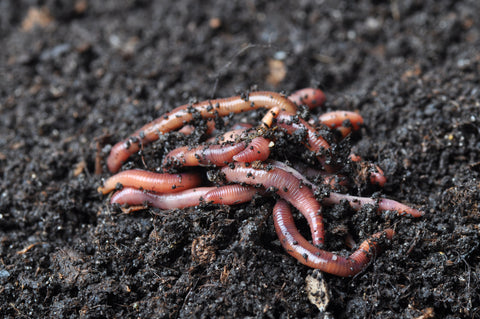
Demand for these products comes from 3 main sectors:
- Agriculture (worm castings)
- Fishing (nightcrawlers)
- Home Composting & Gardening (castings & compost worms)
Identifying which segment of the market you want to focus on is crucial for determining how your worm farm will operate and who you will market to.
Spend time nailing this and don't try to focus on all products from the start!
How Much Does it Cost to Start a Worm Farm
Starting a worm farm can be relatively inexpensive, but the costs vary considerably based on the scale and size of the worm farm. The cost to start a small worm farm can be as low as $100 for 1 lb of worms and a plastic bin. The cost to start a large, commercial worm farm can range from $5,000 to over $100,000 with the main costs being the purchase of worms, land or warehouse to keep them in, and equipment like tractors, trommels, and forklifts.
If you start small with a few lbs of worms, it will likely take 6-12 months to build your worm population up to a point where you can sell some of the worms and begin generating income.
On the other side of the equation, starting with 100,000 or even 1 million worms will increase the start-up costs considerably:
- $2,000 (cost for 100,000 compost worms)
- $500 (cost for 50 bins to keep the worms in)
- $500 (cost for miscellaneous tools you’ll need)
- $1000 (monthly cost of 15 hours per week of labor at $15/hour)
The worms will need food and water, and those will be ongoing weekly costs so it’s important to have a plan for those. Look for free options in your area, either manure or food waste you can compost on site.
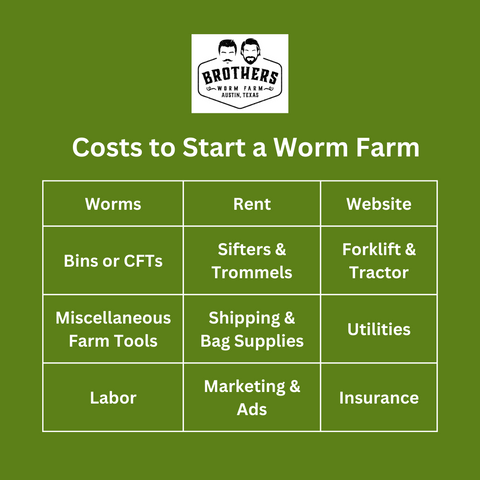
Once you start selling worms you will also need:
- $200-$4000 for a sifter or trommel
- $200 for shipping and bagging supplies
- $500 for initial marketing
And as your populations and operation grows to millions of worms, you will need:
- Forklift ($5,000-$15000)
- Tractor ($4,000-$15000)
- Warehouse or covered space ($2,000-$25,000)
And finally, if you decide you want to produce worm castings you may need a continuous flow through (CFT) reactor which will cost anywhere from $2,000 to $40,000.
Skills Needed to Start a Worm Farm
A successful worm farm requires knowledge of vermiculture, including worm species, their care, and the composting process.
It is critical to understand the husbandry practices of caring for worms, and this only comes with experience!
Variables like weather in your area, bedding, optimal pH and moisture for your worms, and having safe organic waste to feed your worms are important factors to understand as your worm population grows.
In addition to understanding what makes worms tick, starting a worm farm requires business and marketing skills to manage your worm farm as a profitable venture.
Key business skills to have include:
- Being service-oriented
- Tracking cash flow, expenses, and costs
- Basic computer skills (email, how to update a website, and even SEO are all useful)
- Planning and attention to detail
Planning Your Worm Farm
Home Growers vs Commercial Farms
The scale of your worm farm, whether a small home operation or a larger commercial enterprise, affects your investment, revenue potential, and operational approach.
Home growers may focus on personal use or small-scale sales like farmer’s markets or in their local community.
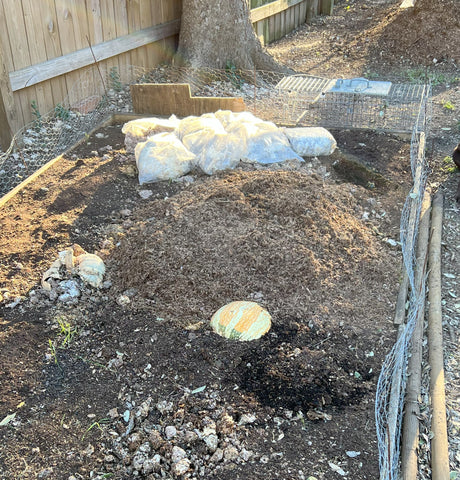
Commercial farms, on the other hand, require more extensive setups, overhead, and start-up expenses, but they also offer higher revenue potential through larger sales channels including:
- online sales,
- lawn and garden distribution,
- commercial growers
Regardless of the approach you take, we recommend starting small, learning how to care for and feed a growing worm population, and growing the business as sales and revenues support it.
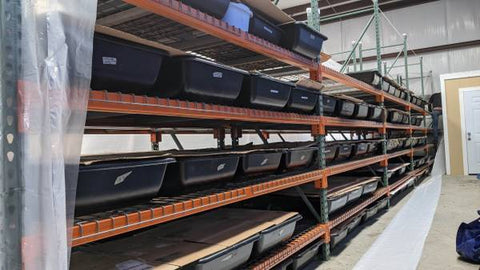
Researching and Understanding Local Regulations
Before starting your worm farm, familiarize yourself with local regulations regarding business licensing, waste management, and agriculture. Compliance early on ensures smooth operation and avoids potential legal issues.
Most states and locales do not have regulations around worms and worm farming (it’s a small niche industry that mostly stays under the radar).
Many states do have local regulations around composting, so these are worth checking into.
In addition, real estate zoning can be an issue if you are operating a worm business on land not zoned as commercial or agriculture.
It’s important to look into this at the start rather than beg (likely unsuccessfully) for forgiveness with the local government later on!
Target Market & Product for Your Worm Business
One of the most important decisions you will make is which product your worm farm will offer and who you will sell it to.
In most cases, you'll focus on either:
- Selling worms for fishing bait,
- Selling worms for composting, or
- Producing worm castings or worm tea for gardening

There is no 1 right answer to these questions, but it is important to know that optimally- producing both worms and castings is very difficult.
The set-up and processes of a worm farm breeding worms differ considerably from those of a worm farm focusing on castings, which is why most large scale worm farms focus on either breeding and selling worms or producing castings.
It’s critical to think through who your market is and which product to offer them first, and then build your operation around the goal of serving that market.
Setting Up Your Worm Farm
Choosing the Right Location
Selecting a location for your worm farm is another crucial decision to make.
If your worm farm will be at your home, you will likely be growing worms in a garage, barn, storage shed, or outside in a window or compost pile.
When considering a location for starting your worm farm, pick one that supports the basic items need to survive:
- Temperature
- Minimal exposure to light and heat
- Shade
- Accessibility for you to easily feed, water, and harvest the worms
An ideal site has shade or cover for the worms, is easily accessible, and does not disturb your household or neighbors.

If you plan to start a larger commercial worm farm with millions of worms, you will need access to several acres of land, a warehouse, or even both.
We recommend starting on the smaller side, renting less space and land than you think you will need. Larger locations can be expensive, and it will take time for your business and sales to grow, so think smaller to start and then expand as sales support.
Selecting the Worm Species
There are 3 main species of worms most worm farms use or sell. These are:
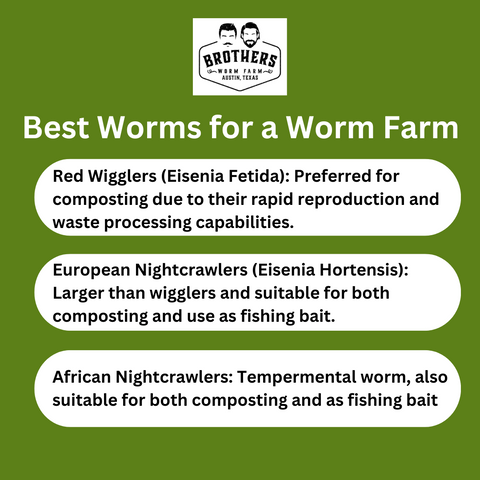
These worm species differ by their size, hardiness, ability to thrive in different conditions, and many other factors, so it’s important to understand and have extensive experience with the worm species you select!
Essential Equipment and Supplies
Starting a worm farm means buying a variety of equipment and supplies needed to keep worms happy and also simplify your work.
The basic materials you will need to get started include:
- Bedding Materials: Provides a habitat for your worms. Common materials include compost, manure, food waste, shredded paper, cardboard, and coconut coir.
- Worm Bins or Containers: Enclosures for housing your worms. Options range from DIY wooden bins to commercially available plastic containers.
The actual equipment you will need depends on your operation and set-up, but it likely includes many of the following items:
- Common farm gardening equipment like shovels, rakes, brooms, etc
- Wheelbarrows and dollies
- 5 Gallon buckets
- Hoses, nozzles, and sprayers
- Worm sifters or trommels
- FIBC bags to store castings
- Forklift, tractor, pallet jacks (for larger operations)
Feeding Your Worms
One of the great things about the worm farm business is that feedstock for your worms can usually be found at low or no cost.
Worms can eat a variety of organic matter, including:
- Composted hog, dairy, horse, chicken or goat manures
- Composted food waste (no meat or dairy!)
- Carbon waste (e.g., saw mill, mulch, etc.)
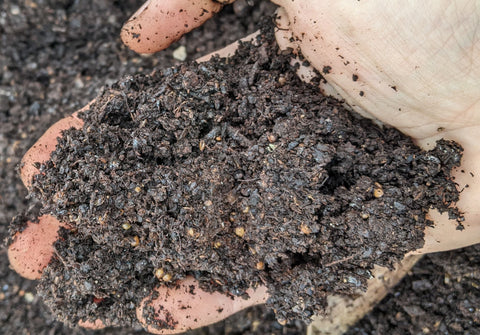
However, worms are not patient and if they aren’t being fed they may leave the pile or bin in search of food.
So it’s crucial to have a predictable source of food ready for them at all times!
To find food, reach out to local farms, waste haulers or other businesses that may have waste.
The perfect situation is one where another company is looking to get rid of waste that you can easily use as worm bedding and feedstock! This situation gives you ready access to a food source at a low or no cost.
Marketing and Selling Your Worms or Castings
There is a lot of work involved in marketing and selling your worm farm products.
Once you determine what you are selling, check competitor pricing and determine your own pricing. Make sure to take into account shipping, labor, packaging and related costs.
It can also be helpful to review competitor’s packaging and how they brand their products, as this info can be useful as you build out your own packaging and branding.
Marketing Strategies When Starting a Worm Farm
There are many marketing strategies to consider when starting a worm farm.
The strategies you use will depend on what you are selling and which market you are targeting (e.g., local or national).
For local marketing, facebook and social media are great options for getting the word out to your community.
Contacting lawn and garden centers or local gardening clubs are other good sources of outreach. These groups may even offer to have you present or talk at an upcoming gardening meeting.
Some folks also sell at farmers’ markets.
For more regional or national sales, you will need to use a combination of online marketing and sales outreach. Here’re some of the channels to consider:
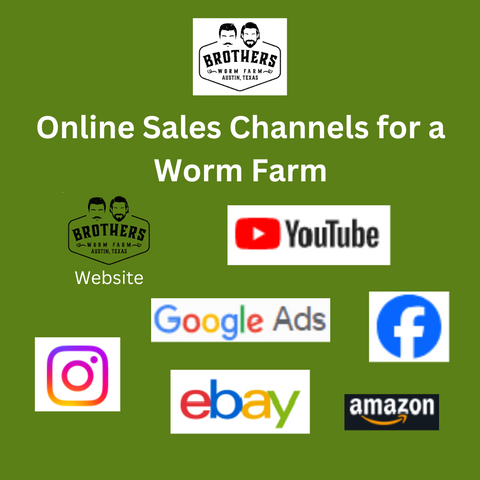
How to Start a Worm Farm: Challenges & Solutions
Common Challenges in Worm Farming
Worm farming can be a very rewarding but it is also hard work with some risks.
Issues such as pest infestations, unfavorable environmental conditions like winter storms or excessively hot summers, and fluctuating market demand can impact your farm.
Have contingency plans for extreme weather events or pest issues, and be ready to act quickly to address unforeseen circumstances.
Worms are primitive creatures and can die (or leave) quickly, so it’s critical to maintain consistent living conditions for them even in the face of pest or weather issues!
How to Start a Worm Farm: Frequently Asked Questions
How to Start a Worm Farm for Fishing?
To start a worm farm for fishing, it is important to pick the best fishing worms that will 1) breed and thrive in your climate and 2) are good for the type of fish you want to catch. The 3 best fishing worms are all nightcrawlers - Canadian, European (ENC),and African. In addition to worms, you will need a worm bin to breed the worms as well as an ongoing source of food to feed the worm farm.
How to Start a Worm Farm for Profit?
To start a worm farm for profit, follow these 5 important steps: 1) Identify Market & Product: Who you will sell to and which product (worms or worm castings) will you sell. 2) Business Planning: Cover financial and cost projections and how you will sell and market your product. 3) Set-up: Choose your location and acquire the necessary equipment, including worms like Red Wigglers or European Nightcrawlers. 4) Bedding & Feedstock: Identify reliable sources of organic waste to feed your worms 5) Operation - Implement efficient feeding, bedding, and farm maintenance practices. By focusing on these steps, you can build a profitable worm farm that contributes to sustainable agriculture and waste management!
What is Commercial Worm Farming?
Commercial worm farming is the large-scale cultivation of worms for the production of vermicompost and live worms for use in agriculture, gardening, and fishing. Unlike hobbyist operations, commercial worm farms operate as full-blown businesses, focusing on mass production with millions of earthworms to meet the demands of various customers and markets. These farms utilize extensive setups with large worm bins or beds, employing systematic feeding, breeding, and harvesting methods to ensure high productivity and product quality.
Comments
Really awesome of y’all to post this, it really shows how much work y’all have put into this! As a composter, I’m grateful for folks like y’all!

